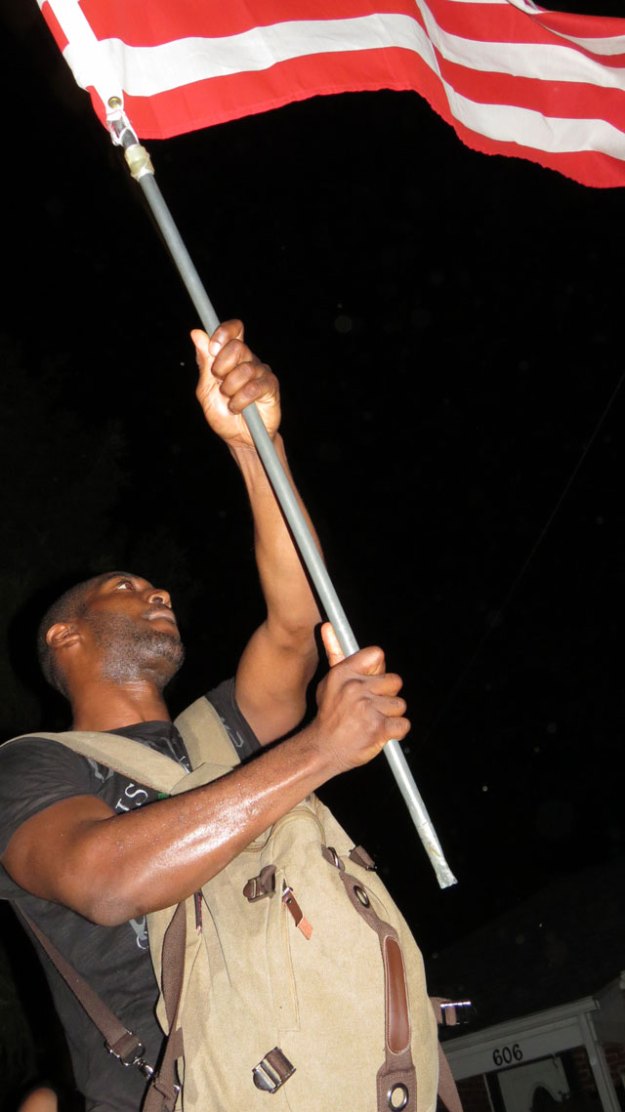
A man waves the American flag during a protest march down West Florissant Avenue on Friday, Aug.22. (David DesRoches photo)
This is the second part of a series on the events in Ferguson called “Healing St. Louis”. Read the first part, “Ferguson got their attention” here.
Simply driving to the Canfield neighborhood is its own experience. It’s where 18-year-old Michael Brown was shot to death by Ferguson Police officer Darren Wilson under unclear circumstances. Concrete barricades block nearly all intersections around it. A worn path around one obstacle is the only way in. The path seems to symbolize an adaptive resilience that the community has adopted, if not in protest, then perhaps for survival.
“They try to block us in, but you see that ain’t working,” said 27-year-old Jermell.
It’s unclear whether people are having problems getting to work or obtaining medicine or medical care.
Police cars strobe blue and red light onto confused faces that wonder why they’re being told to drive a mile out of the way to move 100 feet ahead. Officers ask for IDs. People show them who they are.
At the memorial for Michael Brown, over a thousand roses lay head-to-toe in succession along the center of the street, interspersed with glow sticks. Candles flicker, cameras flash. Signs read: “Stop killing us” and “Peace Love Justice.”
One thing is certain; the community in “the county” (of St. Louis) has been forever changed — if not in reality, than in the supra-reality of mass media infused perceptions. Those not in St. Louis will, for decades, think of abusive police and/or unruly black people when they think of this Mississippi River city.
Yet, when the media leaves, Ferguson will remain. When the hundreds if not thousands of police officers from all over the area finally abandon West Florrisant Avenue, most of the boarded up businesses will return. But will life go back to normal?
So many questions remain unanswered in the early days of this apparent revival of a long civil rights struggle. How can the police regain the trust of the community it serves? Will residents ever again feel safe in their own neighborhood?
Ferguson has also resurrected America’s most embarrassing elephant in the room —racism. More specifically, it’s brought to surface long-held allegations that the criminal justice system disproportionately targets and prosecutes black men for crimes, despite numerous studies showing that crime activity is steady across all races in the United States.
This phenomenon, as author and lawyer Michelle Alexander puts it in her book “The New Jim Crow,” creates a second-class citizenry in which convicted felons find themselves unable to vote or participate in a jury, restricted from public housing and relegated to rules of living that don’t apply to “first-class” citizens.
When voting statistics are calculated, and black turnout is often quite low, rarely is it considered that around 30 percent of American black men are either in jail, on probation or on parole, creating physical and often legal restrictions from voting.
In Ferguson, in St. Louis, in cities across the land of the free, people feel imprisoned. People are imprisoned, literally or figuratively, by a self-perpetuating system of for-profit prisons and political agendas that justifies its existence through manifestations of its power. To maintain existence, prisons must be filled.
Abuse isn’t relegated to those enforcing justice (or some interpretation of it). It has become the norm for many in American society. In one Long Island prison, pregnant women commit small crimes to be thrown in jail, where they birth their babies under full medical care. In other prisons, the elderly do the same so they can have access to doctors and “three hots and a cot.”
Why is crime so high among poor black folks? Or, to ask from another angle: Why wouldn’t poor black people commit crimes? Why wouldn’t any poor person commit a crime?
Check out the third part, “Maintaining their attention” tomorrow at FergusonFiles.com
